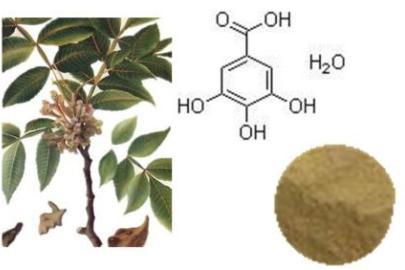Canadian Study Discovers That The Phytochemical Tannic Acid Inhibits Three Critical Pathways Involved In SARS-CoV-2 Infection
Source: COVID-19 Herbs And Phytochemicals Mar 11, 2022 3 years, 1 month, 2 weeks, 1 day, 11 hours, 36 minutes ago
COVID-19-Herbs: Canadian researchers from Laval University-Quebec City, Université de Montréal, Université du Québec à Montréal, Université McGill and the Centre Armand-Frappier Santé Biotechnologie have in a new study found that the phytochemical tannic acid is able to inhibit three key pathways involved in SARS-CoV-2 infection and could be used to develop drugs to prevent and treat COVID-19.

Tannic acid is a plant phenol typically extracted from the following plant parts: Tara pods (Caesalpinia spinosa), gallnuts from Rhus semialata or Quercus infectoria or Sicilian sumac leaves (Rhus coriaria). It is found in practically all aerial plant tissues including various tea leaves and also herbal teas. Tannic acid is also found in lower quantities in red wines and their consumption would not have any protective effects because of their low concentration of tannic acid.
Its weak acidity (pKa around 6) is due to the numerous phenol groups in the structure. The chemical formula for commercial tannic acid is often given as C76H52O46, which corresponds with decagalloyl glucose, but in fact it is a mixture of polygalloyl glucoses or polygalloyl quinic acid esters with the number of galloyl moieties per molecule ranging from 2 up to 12 depending on the plant source used to extract the tannic acid.
Tannic acid was historically used for the treatment of diarrhea, topically to dress skin burns and rectally for treatment of unspecified rectal disorders.
Tannic acid is also taken by mouth and applied directly for bleeding, chronic diarrhea, dysentery, bloody urine, painful joints, persistent coughs, and cancer. Vaginally, tannic acid is used as a douche for white or yellowish discharge (leukorrhea).
According to the Canadian study team, “The identification of small natural ligands that could prevent the entry and/or replication of the coronavirus remains a pertinent approach to fight the coronavirus disease (COVID-19) pandemic.”
The study team previously showed that the phenolic compounds corilagin and 1,3,6-tri-O-galloyl-β-D-glucose (TGG) inhibit the interaction between the SARS-CoV-2 spike protein receptor binding domain (RBD) and angiotensin-converting enzyme 2 (ACE2), the SARS-CoV-2 target receptor on the cell membrane of the host organism.
By building on these promising results, the study team further assessed the effects of these phenolic ligands on two other crucial targets involved in SARS-CoV-2 cell entry and replication, respectively: transmembrane protease serine 2 (TMPRSS2) and 3-chymotrypsin like protease (3CLpro) inhibitors.
Importantly, since corilagin, TGG, and tannic acid (TA) share many physicochemical and structural properties, the study team investigated the binding of TA to these targets.
This
COVID-19 Herbs and Phytochemicals study which involved a combination of experimental methods (biochemical inhibition assays, surface plasmon resonance, and quartz crystal microbalance with dissipation monitoring) confirms the potential role of TA in the prevention of SARS-CoV-2 infectivity through the inhibition of extracellular RBD/ACE2 interactions and TMPRSS2 and 3CLpro activity.
Furthermore, molecular docking prediction followed by dynamic simulation and molecular mechanics Poisson–Boltzmann surface area (MMPBSA) free energy calculation also shows that TA binds to RBD, TMPRSS2, and 3CLpro with higher affinities than TGG and corilagin.
The study findings suggest that naturally occurring tannic acid is a promising candidate to prevent and inhibit the infectivity of SARS-CoV-2.
The study findings were published in the peer reviewed International Journal of Molecular Sciences.
https://www.mdpi.com/1422-0067/23/5/2643
Lead and corresponding author, Professor Dr Charles Ramassamy and his postdoctoral researcher Dr Mohamed Haddad at Institut national de la recherche scientifique (INRS), in collaboration with scientists from Université de Montréal, McGill University, and Université du Québec à Montréal (UQAM), believe that tannic acid plays a role in inhibiting three important molecular pathways involved in the SARS-CoV-2 infection.
Utilizing a multidisciplinary approach, the study team showed that tannic acid inhibits the viral protein (RBD) of the British variant of SARS-CoV-2 from binding to its biological target, the ACE2 receptor. This receptor, which is found on the surface of many cells in the body, allows the virus to latch on and infect them.
Professor Ramassamy told Thailand
Medical News, "Tannic acid binds to the RBD protein and prevents it from binding to the ACE2 receptor."
He further explained that in blocking the viral protein, tannic acid does not alter the physiological functions of ACE2 receptors, which have important physiological functions in the body's respiratory, cardiovascular, and renal systems, among others.
The study team further investigated the effects of tannic acid on other key mechanisms involved in SARS-CoV-2 infection downstream of the RBD-ACE2 bond.
The study findings showed that the polyphenol can inhibit the activity of the enzyme that allows the virus to enter our cells (TMPRSS2), as well as the viral enzyme responsible for replicating the virus (3CLpro).
The antiviral effects of tannic acid on the RBD protein and these enzymes pave the way for further research on the entire virus in contact with human cells. If the beneficial properties are similar on a larger scale, tannic acid tablets or nasal spray could be envisaged as a means for preventing or blocking SARS-CoV-2 infection.
Tannic acid would be less expensive than the antivirals currently on the market, and there would be fewer side effects because of the low toxicity of tannic acid and other polyphenols.
Professor Ramassamy added, “Furthermore, tannic acid and its physiological derivatives have anti-inflammatory and antioxidant properties, both of which are beneficial if you are infected with SARS-CoV-2.”
Clinical trials are currently underway to assess the efficacy of tannic acid in the prevention and treatment of COVID-19 in various centers in Canada, Brazil and also in Japan.
Please help support this website by making a donation not only for the sustainability of the website but also for all our research and community initiatives. We are not funded by any entities and really need help. Your help not only saves lives directly but also indirectly. https://www.thailandmedical.news/p/sponsorship
For more on
COVID-19 Herbs, keep on logging to Thailand Medical News.
